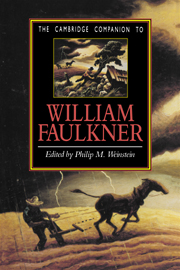1 - Faulkner and Modernism
from Part I - The Texts in the World
Published online by Cambridge University Press: 28 May 2006
Summary
When I think Faulkner, I'm usually reading, writing, or teaching (and learning) about his work, or performing some combination of these three activities, and perhaps it is these activities that suggest the three things I think of Faulkner’s work as doing and enabling others to do, the things I think literature and other cultural work can do at its best. First, his work reflects or represents certain realities (as in much reading, especially of “readerly” texts). It never does so directly, but it often does urge readers' attentions on past a relatively transparent medium toward the apparently solid message, past questions of how we are seeing toward questions of what we are seeing, in ways that tend to reinforce or articulate (or rearticulate) what seems natural, what seems like common sense. However, Faulkner’s work, at other places and times in it, or in the reading, writing about, or teaching of it, also pointedly criticizes those same realities it represents, calling readers' attention back from what they see to how they see it, to the '"nature" of reality and to ''common sense" as constructions and questions for discussion (as in much writing, especially of "writerly" texts). And in still other ways, Faulkner’s work participates in the ongoing social construction of those realities insofar as readers, writers, teachers, and students more or less consciously respond to such questions of nature and common sense as important cultural works in progress, an ongoing process of social negotiation and change (as in much teaching and learning, for example).
- Type
- Chapter
- Information
- The Cambridge Companion to William Faulkner , pp. 17 - 30Publisher: Cambridge University PressPrint publication year: 1995
- 2
- Cited by



